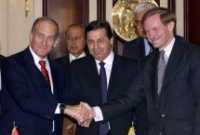Minister of Industry, Trade and Labor, Minister of Communications and deputy-premier Ehud Olmert signed last Thursday an upgraded trade agreement with the Jordanian Minister of Industry and Trade Ahmad Hindawi.
The free trade agreement would allow the two countries to jointly export tax exempt goods to the European Union.
The deal obliges Jordan to abolish many customs duties on Israeli products by 2010. The EU has long pressed for such a move, which Jordan hopes will secure better customs and trade quota terms with the wealthy bloc.
In a statement issued before the signing ceremony Hindawi said the cooperation has allowed Jordan to sharply increase its trade with the U.S. in recent years. Hindawi added that he "hope the same results will occur in exporting to Europe.".
Mr. Olmert expressed his hopes that the agreement would strengthen the links between the two countries, which in 1994 signed a peace agreement, and other Arab states.
"Trade agreements will permit improving our relations with Arab states, including the Palestinians," Olmert said during his meeting with King Abdullah that followed the signing of the trade accord.
The agreement includes a one-third reduction of customs duties on Israeli exports to Jordan, while customs duties on Jordanian exports to Israel will be halved. The agreement also stipulates that both sides will continue gradually lowering customs duties, until the duties are totally eliminated in 2010.
Israel and Jordan signed a partial trade agreement in 1995, which Israel claims provided benefits mostly for Jordan. Minister of Industry, Trade, and Labor Ehud Olmert said that the current agreement would be Israel’s most advanced trade treaty with an Arab country.
The agreement will become effective as soon as it is approved in early 2005.
The current stage in upgrading the trade agreement is due to the anticipated extension of the pan-European accumulation system to Mediterranean basin countries in the first quarter of 2005.






